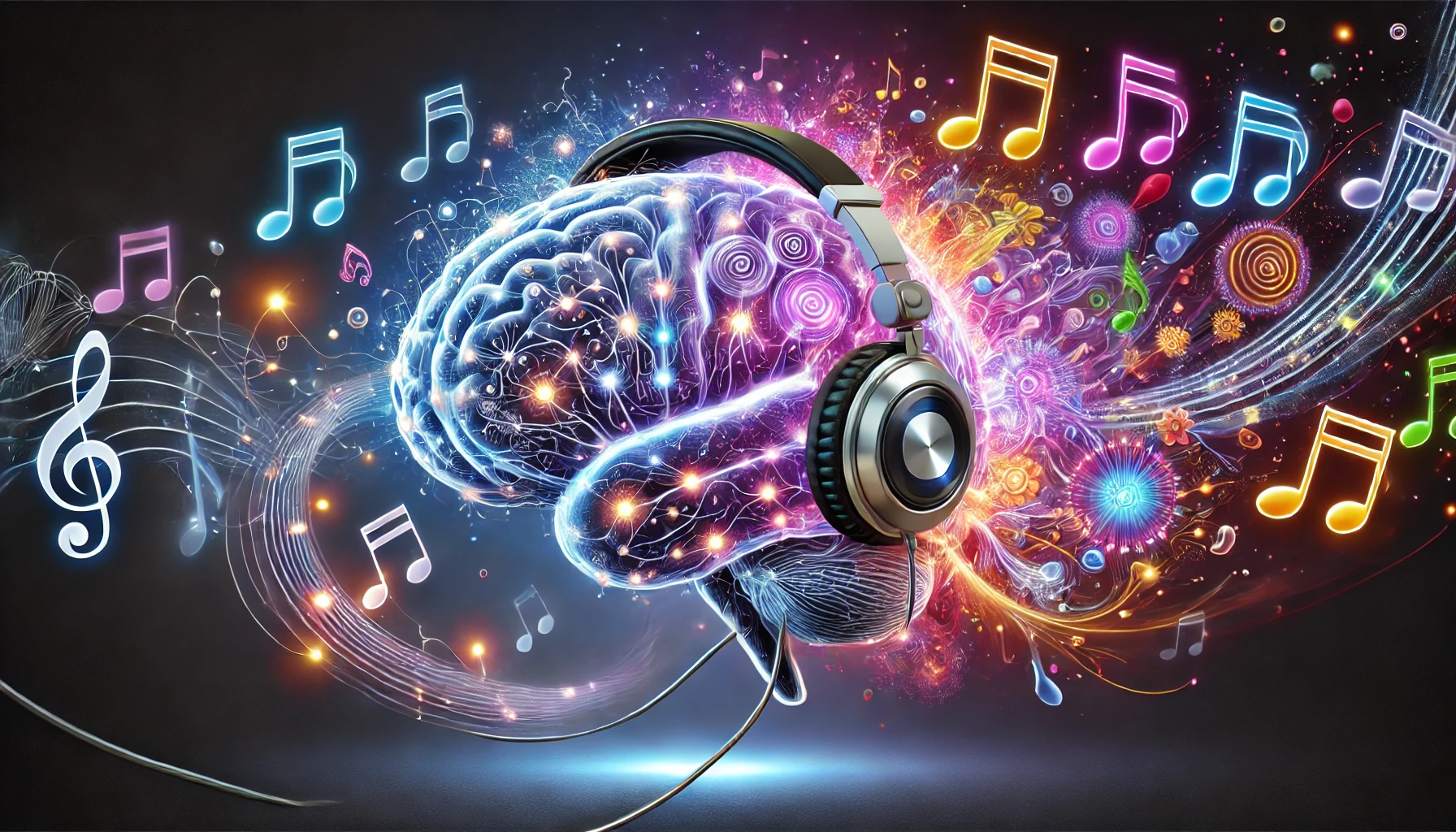What are the psychological effects of music on the brain? I love the quiet moments when a song transforms my mood in unexpected ways. Music isn’t just a combination of rhythms and harmonies; it’s a powerful catalyst for emotional change. I’m not alone in my experience. It’s a universal truth that music and emotions are intricately linked. Researchers have been keen to explore this relationship, diving into how and why music can elicit such strong emotional reactions from us.
There was a study conducted by McGill University in Montreal, Canada. Researchers used brain imaging techniques to observe how participants responded to their favourite music. They found that listening to music can release dopamine, the brain’s pleasure chemical. This dopamine release happens at peak emotional moments in the music, explaining why music can sometimes give us chills.
Understanding the Psychological Effects of Music and Emotions
Music broadly influences our emotions and there are many psychological theories for this. Understanding the psychological effects of music and emotions unearths fascinating insights into human behavior and the ways in which we might harness music’s power for our well-being. As we explore this topic, remember the role of music in your own life. Whether it’s the joy of hearing your favourite tune or the catharsis of a sad melody, music has the remarkable ability to color our emotions in vibrant hues.
Decoding How Music Affects Our Emotional Brain
The Limbic System and Emotional Processing
Have you ever wondered why a certain melody can whisk you away to a fond memory or tug at your heartstrings? Quite a bit of this magic lies within the intricate workings of our brains. When we listen to music, several regions light up, creating an orchestra of neural activity. The limbic system, which includes the hippocampus and the amygdala, usually steals the limelight in this process. It’s critical for emotional processing and memory formation, explaining why that one song on the radio can stir up such powerful nostalgia or a sense of melancholy.
Perception vs. Emotional Response
Dr. Daniel Levitin, a neuroscientist and author of “This Is Your Brain on Music”, explains that “the emotional response to music is one of the most powerful experiences we can have.” He notes that music’s ability to engage the brain’s reward system, often through unexpected musical changes or familiar melodies, underscores its profound emotional impact. There’s also a fascinating distinction between how we perceive emotions in music and what we actually feel. Have you ever appreciated a sad song even when you’re not particularly sad? Our brains are constantly interpreting the emotional content of music, but our personal, emotional response can differ based on our individual experiences and context.
Harmonic Resonance: Why Certain Melodies Trigger Emotional Responses
Ever asked yourself why a single melody can send a shiver down your spine or bring tears to your eyes? It’s the harmonic resonance, the vibrations that strike a chord in your heart. Researchers point to the structure of music itself—a blend of rhythm, tempo, and volume—as a fundamental element in evoking emotion. Major scales, often bright and uplifting, are typically associated with happiness or excitement, while minor scales, with their lowered notes, suggest sadness or contemplation.
Production Techniques to Evoke Emotions
To evoke specific emotions, producers often use techniques like reverb and delay to create a sense of space and depth. For example, Phil Spector, known for his “Wall of Sound” production technique, layered multiple instruments to create a rich, immersive sound. Hans Zimmer, renowned for his work on scores like “Inception” and “The Lion King,” uses orchestration and electronic elements to build emotional intensity. These techniques can transform a simple melody into an emotionally charged piece.
Music as an Emotional Catalyst and Healer
The psychological effects of music and it’s ability to affect our feelings is well-established. It’s not merely a backdrop to our daily lives; it actively influences our emotional well-being. Music therapy, a growing field, harnesses this power to support mental health. The idea that music can be used as a healing tool is increasingly supported by evidence. Studies have demonstrated its success in managing stress, alleviating anxiety, and even reducing symptoms of depression. It adds a unique layer to the therapeutic process, allowing individuals to explore and express emotions in a non-verbal way, which can be profoundly liberating.

Evidence and Applications of Music Therapy
One notable case study involves the use of music therapy in patients with Alzheimer’s disease. Research from the Mayo Clinic in Rochester, Minnesota, has shown that music can improve mood, behavior, and even cognitive function in Alzheimer’s patients. By listening to music that holds personal significance, these patients often become more communicative and engaged, showcasing music’s ability to reach parts of the brain that are otherwise difficult to access. A compelling aspect of music therapy is its wide-ranging applications. It’s been used in various settings, including hospitals, schools, and assisted living homes, demonstrating its versatility as a tool for emotional enhancement.
Personal Transformations through Music
When talking about personal transformations, there’s no shortage of anecdotal evidence. You might have experienced this yourself or know someone who has: a song that lifted spirits on a tough day, or a melody that provided solace during a time of loss. These individual stories contribute to the growing understanding the psychological effects of music and it’s healing potential. Musician and producer Quincy Jones once said, “Music can change the world because it can change people.” This sentiment captures the transformative power of music on an individual and societal level.
Composing the Soundtrack of Our Lives: Personal and Societal Implications
I often wonder how frequently we insert headphones into our ears, letting music orchestrate the backdrop of our daily routines without fully grasping its potent role. Music isn’t just a complement to life; it actively shapes and narrates our personal experiences. Each playlist becomes a soundtrack that tracks our highs and lows, our triumphs and tribulations. But this isn’t wholly an individual experience. Music has knitted itself into the fabric of societies, marking milestones from weddings to state funerals, igniting social movements or simply uniting strangers in a moment of shared feeling. In its vibration, we find a common pulse, a language beyond words that speaks to the collective soul.
Artists and Their Emotional Craft
Artists and composers are often keenly aware of this dynamic and intentionally weave emotional threads into their creations. They hold a mirror to our feelings, sometimes giving voice to emotions we struggle to express. As listeners, we might not always recognize this crafting, but we respond to it viscerally, in the tapping of a foot, in a tear shed, or in the irresistible urge to sing along. A poignant example is the song “Imagine” by John Lennon, which became an anthem for peace and unity. Its simple yet powerful lyrics and melody have resonated across generations, proving the psychological effects of music and it’s ability to influence social consciousness and bring people together.
The Future of Music’s Emotional Impact
Looking forward, researchers continue to explore the vast landscape of music’s impact on human emotion. The future may offer us novel ways to harness songs and symphonies for reinforcing our mental health, building more empathetic communities, and even driving social change. It’s intriguing to consider how the next melody might just start a revolution in the heart or in the wider world. In essence, music is a steadfast companion, a mediator of our emotions, and a bond that connects us in unexpected ways. It is a testament to our shared humanity, a celebration of the spectrum of emotions that define us, and a powerful tool that, when struck, resonates with the very core of who we are.

Why ‘Hit’ Songs Connect with People’s Emotions
The Formula for a Hit
Hit songs often have a specific formula that connects deeply with listeners. This formula can include catchy melodies, relatable lyrics, and a structure that builds anticipation and release. These elements work together to engage listeners on multiple levels, from the first listen to repeated plays.
The Role of Familiarity and Repetition
One reason hit songs resonate so strongly is their use of repetition. Repeated choruses and hooks make the song easy to remember and sing along to. This repetition creates a sense of familiarity, which can be comforting and enjoyable. Research shows that people tend to prefer songs that they have heard multiple times, known as the “mere exposure effect.”
Emotional Connection Through Relatable Lyrics
Hit songs often feature lyrics that listeners can relate to on a personal level. Themes of love, heartbreak, and triumph are common because they are universal experiences. When listeners hear a song that reflects their own feelings or experiences, it creates a powerful emotional connection.
The Impact of Production Quality
High production quality is another key factor in the success of hit songs. Professional mixing and mastering ensure that the song sounds polished and appealing on any playback system. This quality enhances the listening experience and helps the song stand out among others.
The Paradox of Nickelback: Consistent Hits Amid Criticism
The Rise of Nickelback
Nickelback, formed in Alberta, Canada, in 1995, quickly rose to fame with their distinctive post-grunge sound. Their breakthrough single “How You Remind Me” in 2001 was a commercial success, topping charts worldwide. This song, with its relatable lyrics and memorable melody, exemplified their ability to craft hits that resonated with a broad audience.
The Criticism and Mockery
Despite their success, Nickelback has often been the subject of criticism and jokes. Many detractors label their music as formulaic, overly commercial, and lacking originality. Memes and jokes about Nickelback’s music are widespread on the internet, contributing to a somewhat negative public perception. Yet, this hasn’t deterred the band from continuing to produce hit songs and maintaining a dedicated fanbase.
Why Nickelback Still Succeeds
So, why does Nickelback continue to succeed despite the mockery? Several factors contribute to their enduring popularity:
- Catchy and Accessible Music: Nickelback’s music features strong hooks, singable choruses, and relatable themes, making their songs easy for a wide audience to enjoy.
- Consistency: The band has maintained a consistent sound that appeals to their core audience. They know what works for them and stick to it, ensuring a steady stream of hits.
- Emotional Connection: Many of Nickelback’s songs touch on universal themes such as love, loss, and perseverance. This emotional resonance helps listeners connect with their music on a personal level.
- Professional Production: High production quality ensures that their music sounds polished and radio-friendly, appealing to mainstream audiences.
- Persistent Marketing: Effective marketing and media strategies keep Nickelback in the public eye, ensuring their music reaches a large audience.

The Emotional and Psychological Connection
Nickelback’s success, despite criticism, ties back into the main topic of how music connects with people’s emotions and the psychological effects of music. The band’s ability to create emotionally resonant songs that are widely accessible highlights the psychological mechanisms at play.
Emotional Resonance
Nickelback’s songs often delve into universal emotions and experiences such as love, heartbreak, and perseverance. These themes are universally relatable, allowing listeners to project their own experiences onto the music. This emotional resonance is key to why their songs remain popular despite widespread mockery.
The Power of Familiarity
The familiarity of Nickelback’s sound plays a significant role in their success. The band’s consistent style creates a sense of comfort and reliability for their fans. This familiarity, combined with their emotionally charged lyrics, enhances the the psychological effects of their music.
Production Techniques
Nickelback’s polished production quality also contributes to their emotional impact. By employing professional mixing and mastering techniques, the band ensures their music sounds clean and impactful. This high-quality production helps amplify the emotional weight of their songs, making them more appealing to a broad audience.
Guilty Pleasures: The Allure of “Cheesy” Music
Guilty pleasures refer to songs or artists that people enjoy despite considering them cheesy or gimmicky. But how do the psychological effects of music apply here why do these guilty pleasures hold such appeal?
The Psychology Behind Guilty Pleasures
- Nostalgia: Many guilty pleasure songs are tied to specific memories or times in our lives. Listening to them can evoke a sense of nostalgia and comfort.
- Simple Enjoyment: Sometimes, people enjoy music simply because it makes them feel good. Catchy tunes and repetitive hooks can be satisfying and fun, even if they’re not critically acclaimed.
- Rebellion Against Norms: Enjoying guilty pleasures can be a form of rebellion against societal or cultural norms about what constitutes “good” music. It allows people to embrace their personal tastes without worrying about judgment.
- Community and Connection: Sharing guilty pleasures can create a sense of community. People bond over mutual enjoyment of songs that might be seen as less sophisticated or serious.
Examples of Cheesy Pop Artists
Cheesy pop artists often dominate this category of guilty pleasures. Here are a few notable examples:
- ABBA: The Swedish pop group is known for hits like “Dancing Queen” and “Mamma Mia”. Their infectious melodies and upbeat rhythms make their music irresistible to many, despite being considered cheesy by some, clearly proving the psychological effects of music.
- Wham!: The British pop duo, featuring George Michael and Andrew Ridgeley, is famous for the song “Wake Me Up Before You Go-Go”. The song’s energetic beat and fun lyrics make it a favorite for many, even if it’s not seen as high art.
- Aqua: The Danish-Norwegian group is best known for their hit “Barbie Girl”. The song’s playful and catchy tune, combined with its quirky lyrics, has made it a staple guilty pleasure.
- Vanilla Ice: His hit song “Ice Ice Baby” remains a classic example of a guilty pleasure. The catchy beat and memorable lyrics make it a fun, if cheesy, favorite.
- MC Hammer: Known for “U Can’t Touch This”, MC Hammer’s upbeat and catchy tune has become an enduring guilty pleasure.
The Emotional Connection of Guilty Pleasures
Even songs considered cheesy can evoke strong emotional responses. These songs often have catchy melodies and repetitive hooks that make them memorable and enjoyable. The emotional connection can be linked to personal memories, simple enjoyment, and the shared experience of enjoying something light-hearted and fun.
Production Techniques and Marketing
Cheesy pop songs often utilize high production values and catchy, repetitive hooks to appeal to a wide audience. Effective marketing and media exposure amplify these songs’ reach, ensuring they become ingrained in popular culture.

In a Nutshell 🥜
The psychological effects of music and it’s on our emotions is profound and multifaceted, involving complex brain mechanisms and deep personal and cultural connections. Whether through the scientific study of its effects on the brain, the practical applications in therapy, or the personal experiences that define our lives, music holds a unique power to transform, heal, and connect. As we continue to explore and understand this power, we open new possibilities for enhancing our emotional well-being and enriching our lives through the universal language of music.




